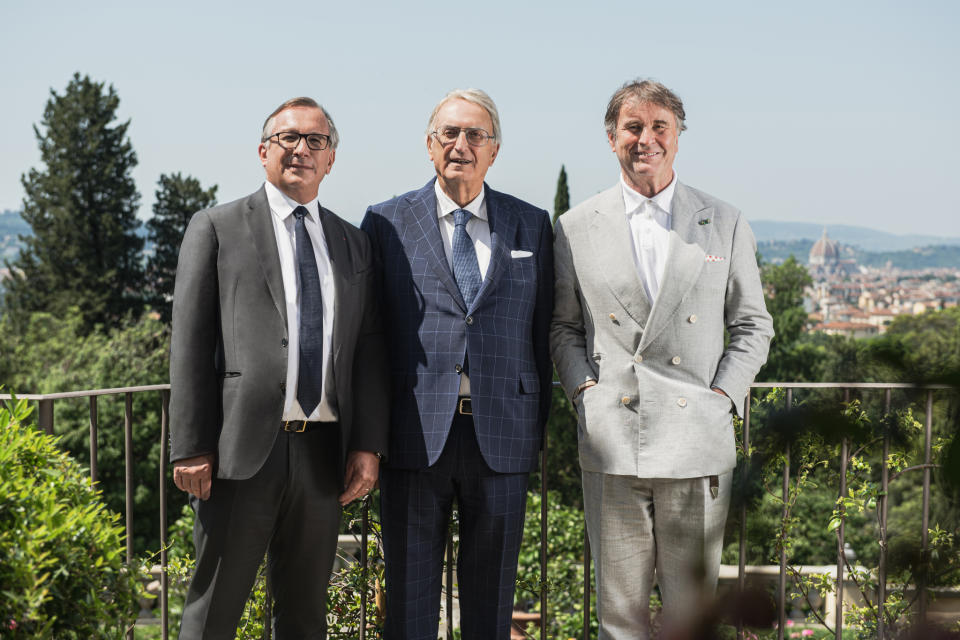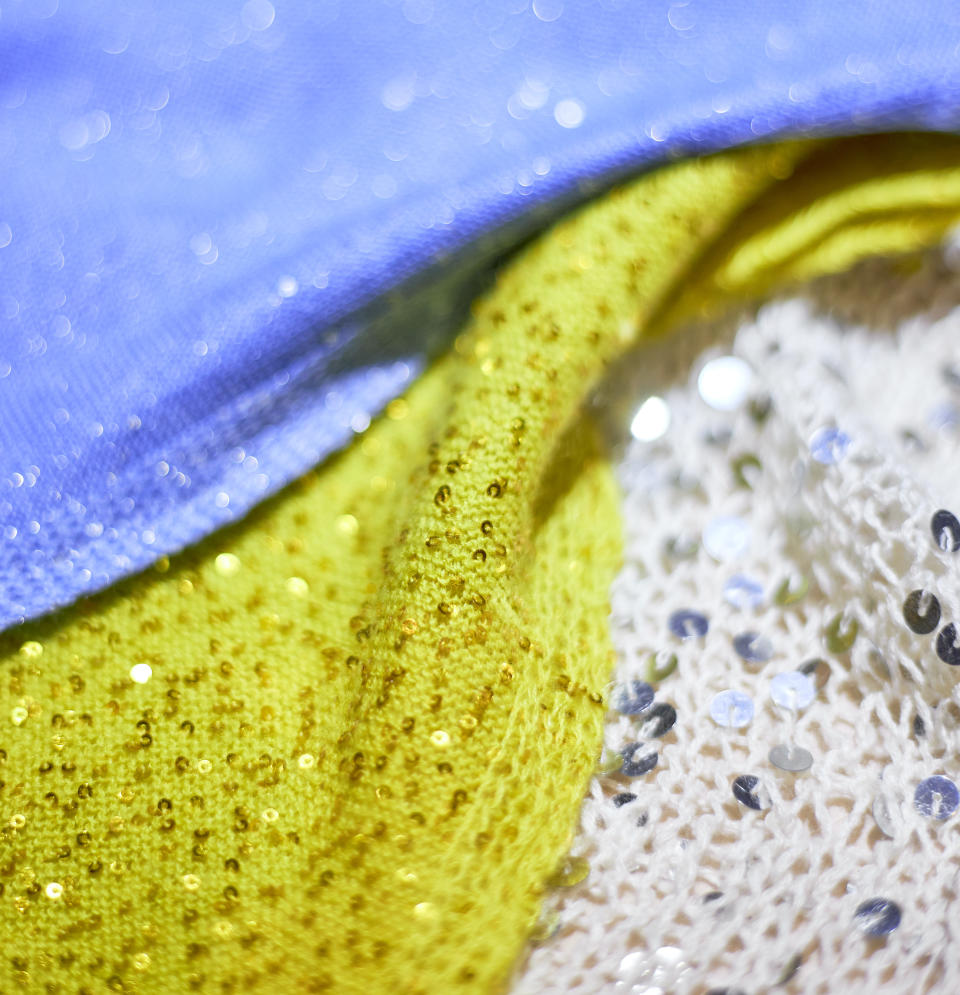Chanel Partners With Brunello Cucinelli in Cariaggi M&A

FIESOLE, Italy — Those involved consider it a win-win-win situation.
In a partnership that may easily be viewed as groundbreaking, Bruno Pavlovsky, Chanel president of fashion, and Brunello Cucinelli, executive chairman and creative director of the namesake company, on Tuesday signed a long-term agreement with Piergiorgio Cariaggi, president and chief executive officer of Cariaggi Lanificio SpA.
More from WWD
Under the terms of the deal, the Cariaggi family will retain control of the namesake company with 51 percent of the shares, while Brunello Cucinelli and Chanel will each have a 24.5 percent stake.
On the terrace of the stunning 14th century Villa Il Salviatino in Fiesole, just outside Florence, with a view of the city and its world-recognized cathedral and Brunelleschi dome, the atmosphere was celebratory, upbeat and forward-looking.
This is a new development in a deal that was signed last year by Cariaggi and Cucinelli, the latter’s first such M&A. At that time, Cucinelli revealed he was buying a 43 percent stake in Cariaggi, his longtime cashmere supplier, “the first to believe in me,” reiterated the entrepreneur on Tuesday.

Cucinelli and Pavlovsky met through Cariaggi as Chanel has been a longtime client of the leading knitting yarn and precious fabrics manufacturer based in Cagli, in the central Marche region.
While Chanel over the years has been buying stakes in 40 suppliers, of which 15 are based in Italy, this is the first time it is partnering with another established fashion brand.
Cucinelli was happy to agree to the deal with Chanel, which he considers “a point of reference in style, in conduct and kindness. I said ‘yes’ immediately.”
Pavlovsky was equally enthusiastic, underscoring “a common vision with Cucinelli, and a shared goal to protect Cariaggi’s exceptional savoir faire,” expressing his belief that “three partners would be better, working in a more efficient and faster way, making it a more interesting step, allowing Cariaggi to have the best means to further develop its technology and vision of quality. Their way of working fully corresponds to ours.”
While financial details were not disclosed, Piergiorgio Cariaggi said the intention is to earmark investments totaling 43 million euros in a business plan spanning until 2030, and channelled into technology as well as sustainability, for example.
For context, WWD reported last year that Cucinelli invested 15 million euros in the acquisition of a 43 percent stake.
RELATED: Brunello Cucinelli Buys Stake in Cariaggi
Cucinelli underscored this was not a deal to be viewed in terms of economics, trumpeting the excellence of Cariaggi’s manufacture. “Chanel is investing in Italy, in the know-how, in the quality represented by Cariaggi and its craftsmanship. For us, that Chanel would enter in the deal was the best possible news, and it ennobles Made in Italy production,” said Cucinelli.
Pavlovsky highlighted the fact that this agreement was not conceived with control in mind, but rather to ensure the best supplies for the next 20 or 30 years.
The deal “leads to more creativity, stimulating innovation, new products and style,” contended Cucinelli, adding that he has already met three of Chanel’s manufacturers.
Cucinelli and Pavlovsky did not know each other before but the “shared values” contributed to hitting it off right away. The latter expressed his admiration for Cucinelli, “who did an extraordinary job in developing his brand.”
Cariaggi said the agreement “helps strengthen” the company and “offers security to the market and to our clients,” which total 1,400 globally. “We work with the most famous brands in the world, from Hermès and Louis Vuitton to Polo Ralph Lauren and this will not change; we will continue to supply other brands,” he observed.
Cariaggi said the company has 300 employees and closed 2022 with sales of 143 million euros. He expects revenues to amount to 150 million euros in 2023.
Cucinelli and Chanel each represent 10 percent of Cariaggi sales.
“This is a very important and exceptional agreement that adds substance and luster to Made in Italy production,” mused Cariaggi, who noted that the company has been investing year-on-year in robotics, making it a “quite unique reality in the textile segment” and in improving the quality of life at the plant, attracting young artisans.
Cucinelli reiterated that “the problem looking ahead is not who we sell to but who will produce. We need to create beautiful plants, train new generations. We must interest young people in quality and natural materials,” echoed Pavlovsky.

Service and timely deliveries are also considerations top of mind.
Pavlovsky noted that Chanel will help “reinforce and support Cariaggi, without changing the strategies but protecting the quality of the yarns, which is exceptional, some of the best in the world.”
Yearly, cashmere accounts for around 60 percent of Cucinelli’s knitwear production and 95 percent of it is supplied by Cariaggi.
In 2012, Chanel bought a stake in Scotland’s storied Barrie manufacturer, which is also a cashmere supplier.
In 2021 Chanel acquired a majority stake in knitwear specialist Paima, which has a focus on outerwear developments, a partnership that at the time was said to aim to support a sector that is essential to the brand’s activity. It was the 40th company to enter the group’s Paraffection division of specialist craft ateliers.
Among other Chanel investments in Italy there are tannery Samanta in Santa Croce and footwear specialist Ballin, for example. They joined embroiderer Lesage and feather-maker Lemarié. All these companies continued to work with external customers.
Cariaggi said the agreement positions the company to drive future growth and helps it invest in sustainability on the human, environmental, cultural and technological fronts.
“To safeguard the future of manufacturing it is necessary to form these alliances,” said Pavlovsky.
Cariaggi, said Cucinelli, is a solid and profitable company and sold a stake owned by a former partner Arnaldo Caprai.
The acquisition is the latest in a brisk M&A activity in Italy’s supply chain, further triggered by the impact of the COVID-19 pandemic and much of it meant to support the know-how and craftsmanship of the country’s fashion pipeline.
For example, in 2021, the Prada and Ermenegildo Zegna groups joined forces to acquire a majority stake in Filati Biagioli Modesto SpA, which specializes in the production of cashmere and other precious yarns, sharing the goal to ensure continuity of the excellence of the company and to develop their own Made in Italy production chain. The acquisition came a few weeks after Zegna bulked up its textile division with the takeover of Tessitura Ubertino.
It is similar to the rationale behind Gruppo Florence, the luxury production pole established in 2020 by industry veteran Francesco Trapani through private equity fund VAM Investments together with Fondo Italiano d’Investimento and Italmobiliare. The goal is to supply high-quality Made in Italy products to major luxury fashion brands by acquiring family-owned Italian SMEs, and “to transform the system and the pipeline into something more modern while defending the value of excellence,” CEO Attila Kiss told WWD last month.
As is customary for Gruppo Florence, which Kiss said has reached sales of 600 million euros, the founding families have agreed to reinvest minority stakes in the holding.
MinervaHub SpA, spearheaded by president Matteo Marzotto, is quickly emerging as a leading aggregator of small- and medium-sized makers of components for luxury brands.
Best of WWD
Solve the daily Crossword

